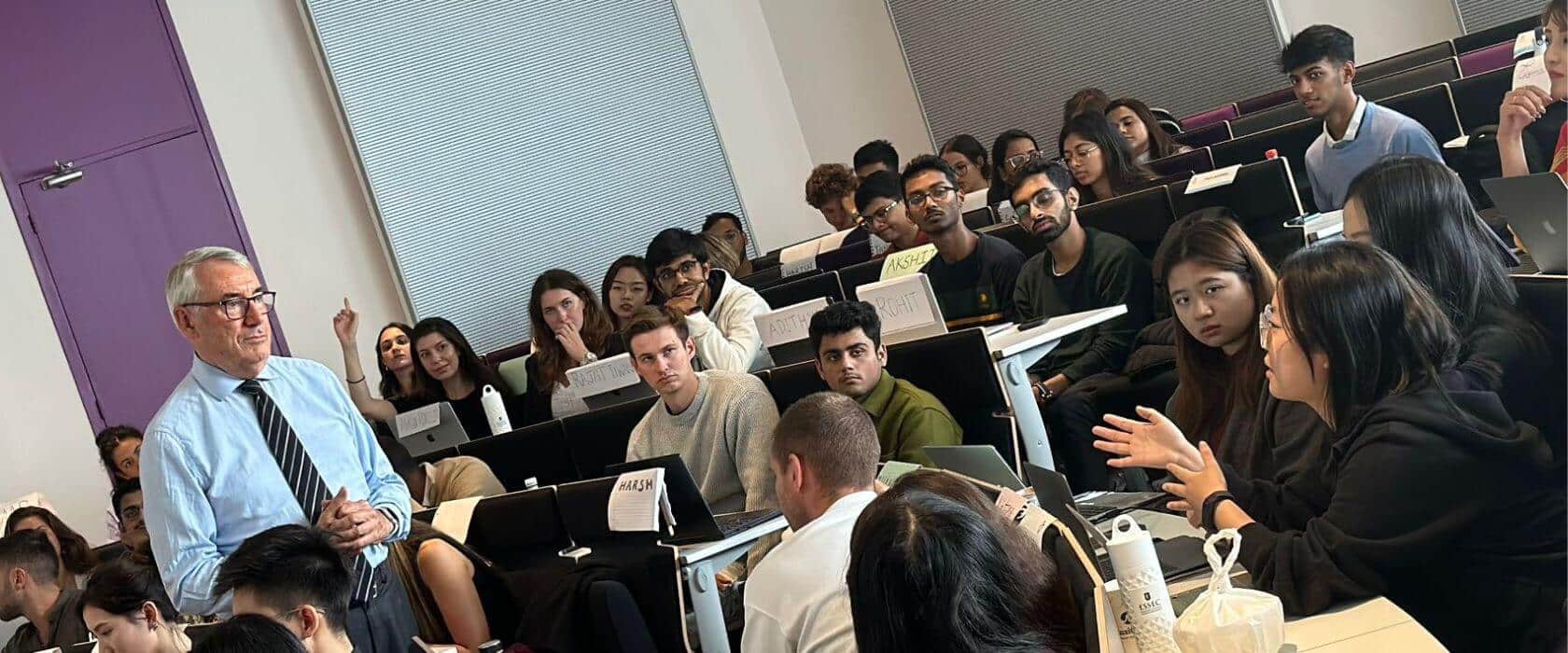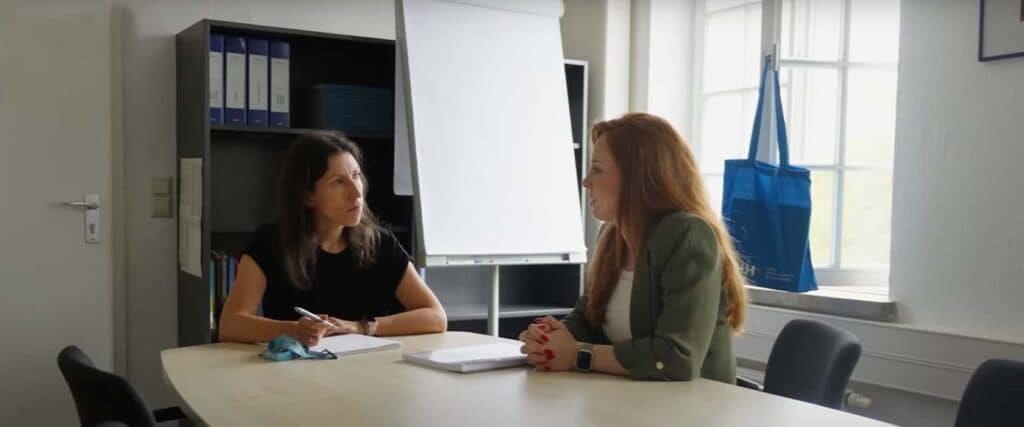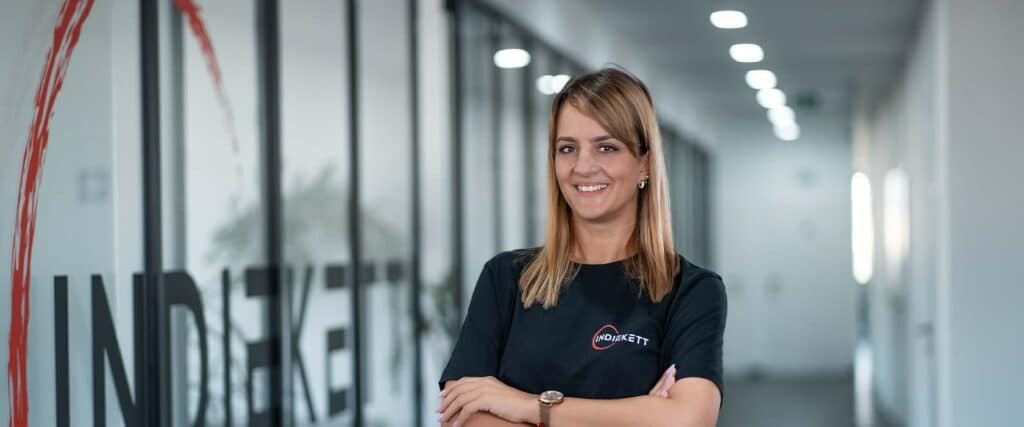What Is the ESSEC Career Learning Lab in Luxury?
ESSEC Business School, with campuses in France, Singapore, and Morocco, is renowned for its luxury brand management expertise. Its Career Learning Lab in Luxury is a cornerstone of the Global MBA program. The Lab offers immersive career development for students pursuing careers in luxury fashion, hospitality, jewelry, and related sectors.
Professor Denis Morisset, a former executive for a range of luxury brands, directs ESSEC’s Career Lab. He is a luxury industry expert. He also teaches luxury brand management, sharing insights from his extensive leadership experience.
Denis explains, “It is an optional module for Global MBA students interested in growing or transitioning their career into the luxury industry.” (00:19)
Through case studies, live projects, and guest lectures from luxury industry leaders, students gain insights into real-world challenges and the future of jobs in the luxury sector. This experience ensures they are well-prepared to enter the workforce upon graduation.
How the Lab Helps Students Build Luxury Industry Careers
ESSEC’s extensive network and strong corporate partnerships with top luxury brands make its MBA program highly valuable. Students benefit from:
- Exclusive access to company projects with brands like LVMH, Chanel, and Kering.
- Workshops on brand strategy, digital transformation, and sustainability in luxury.
- Direct engagement with luxury recruiters through networking events and industry panels.
Denis highlights, “We want the students to understand the importance of know-how and craftsmanship. We bring them to visit, for instance, the Louis Vuitton trunk workshop at Family House, L’Oréal Luxury Division, L’ÉCOLE School of Jewelry Arts by Van Cleef & Arpels.” (01:14)
These immersive experiences offer an exclusive behind-the-scenes look at top luxury brands. It helps students understand the nuances of luxury business strategies and operations.
ESSEC’s Reputation: A Gateway to Luxury Careers
ESSEC holds a strong reputation as a pioneer in luxury education, cemented through its historic partnership with LVMH. Its location in Paris, a global luxury hub in Europe, offers unmatched networking opportunities.
Denis explains, “ESSEC was the first business school in the world to partner with the luxury industry and LVMH back in 1991.” (02:10)
This heritage positions ESSEC graduates strongly in the luxury job market, opening doors to prestigious industry roles.
Key Career Challenges in the Luxury Industry Today
Today’s luxury industry demands continuous adaptation to digitalization, sustainability, and evolving consumer behaviors, requiring constant skill development.
“Digital transformation, digital innovation around data, [and] sustainability issues have all become critical recently for luxury brands and [these] require new skill sets,” says Denis. (03:45)
It requires new competencies to navigate digital innovation, data analytics, and sustainability challenges.
To prepare students, the Career Lab focuses on:
- E-commerce and digital marketing in luxury
- Sustainability strategies and responsible sourcing
- Customer experience innovations in high-end retail
Denis highlights that alongside hard skills, ESSEC teaches crucial soft skills such as adaptability, agility, leadership, interpersonal skills, and global thinking. These soft skills are equally important for graduates entering the luxury industry after graduation.
How the Career Learning Lab Prepares Students for Industry Changes
Luxury careers demand both strategic thinking and deep industry knowledge. ESSEC’s Career Lab helps students develop these skills through:
- Expert-led masterclasses on luxury retail, merchandising, and branding.
- Case competitions that simulate real-world business problems.
- Company visits to luxury headquarters, giving students behind-the-scenes access to top brands.
Denis shares, “Careers are less linear than before, so agility is important to seize the right opportunity at the right moment.” (03:04) Such preparation ensures that students remain competitive amidst industry shifts.
He goes on to describe the proliferation of new global markets and sectors opening up in the luxury space. Fashion houses and luxury brand names are now creating digital experiences, luxury experiences, furniture, cars, wines/spirits, and moving beyond traditional collaborations such as hotels.
Growing markets in Southeast Asia, India, Africa, and, in more recent years, Saudi Arabia and the UAE. Additionally, this emphasizes the importance of programs having a multicultural focus and enabling the leadership of diverse teams.
The Power of Networking: How ESSEC Connects Students with Luxury Leaders
Networking is crucial in the luxury industry, and ESSEC facilitates connections through:
- Industry roundtables with senior executives from LVMH, Richemont, and Hermès.
- Luxury career fairs featuring global recruiters.
- Alumni mentorship programs that help students navigate career paths.
Denis emphasizes, “We create many networking opportunities by bringing a lot more alumni and professionals to the classroom.” (05:22)
He also notes that ESSEC acts as a facilitator, bridging the gap between industry and academia. However, he also highlights that ESSEC encourages students to start networking individually early on, once they’ve joined the program.
ESSEC’s robust alumni network significantly enhances students’ career prospects.
Expert Advice for MBAs Entering the Luxury Industry
For those looking to break into the luxury industry, Denis emphasizes the importance of passion, humility, persistence, and patience.
Denis advises, “They need to be humble, which is not obvious after an MBA. They need to be patient, but at the same time, they really need to show their passion and their determination.” (06:11)
He advises students to develop cultural intelligence, as luxury brands require an understanding of diverse consumer preferences globally.
Common Mistakes MBA Graduates Make in Luxury Careers
A common mistake is aiming prematurely for high-level brand management roles. Denis warns students about unrealistic expectations early in their careers.
He notes, “Many dream to do brand management, even strategic brand management, in a luxury group or for a luxury brand right after the MBA.” (07:15)
He advises students to gain experience first in other roles to better understand the industry dynamics before aiming for these high-level positions. By demonstrating their abilities and making strong contributions in their work, transitioning to higher positions will become more accessible.
Understanding industry realities helps graduates set achievable career goals.
What Makes ESSEC’s Luxury Program Stand Out?
Unlike other MBA programs, ESSEC’s Career Learning Lab in Luxury is uniquely designed to provide:
- A Paris-based learning experience, offering access to the world’s luxury capital.
- A hands-on curriculum, blending academic excellence with real-world business cases.
- A powerful alumni network that ensures graduates have industry mentors and connections for career growth.
Denis affirms, “ESSEC really has a heritage; it has deep roots in luxury, like a luxury brand.” (08:06)
This deep-seated heritage provides graduates with a unique competitive advantage. ESSEC is well-known in the luxury sector and has cultivated respect and close industry ties in its field over the years. Leveraging ESSEC’s network, alumni community, and industry connections offers a significant advantage.
The Future of Luxury Careers: What MBAs Should Expect
If you’re passionate about luxury, an MBA can help you build expertise in the industry. ESSEC’s Career Learning Lab in Luxury is poised and proven to be the best school to prepare you for a career in luxury.
Want to study at ESSEC Business School? Take our eligibility quiz to see if you qualify!





